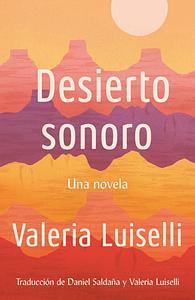Take a photo of a barcode or cover
This is a hard book to review because it's so complex. The main story is of a husband and wife, who each bring a child to their marriage, taking a road trip from New York City to the desert Southwest so that they can each pursue documentary projects that they are passionately interested in. Even before they set out on the road trip the future of the marriage is in question, but the couple's relationship disintegrates further as they travel.
Woven through the story are themes of erasure and loss: the Apache Indian tribes who were the last tribes to surrender to the US government and who the husband is obsessed with documenting. The wife is preoccupied with unaccompanied children who attempt to enter the United States for asylum and who are unceremoniously deported back to their home countries--after enduring unbelievable hardship to get here.
One of the best things about this book is its careful attention to detail. A gesture, a commonplace phrase, the way something looks and what it suggests--all are subject to examination and consideration in the narrative. When I started reading Lost Children Archive this drove me crazy because it made the book drag. Eventually I settled down to the style, and accepted that everything was going to be subjected to the scrutiny of a poet.
There is a book inside this book, too. Elegies For Lost Children is a book that the wife brings with her on the journey and that her children sometimes read from. It's a story of a caravan of unaccompanied children traveling through hardships to reach a place of safety. It is full of literary references, from T. S. Eliot's Wasteland and Conrad's Heart of Darkness to Latin American authors that I was not familiar with.
The main characters, the husband, wife, and two children, do not have names for the first half of the book. When they finally do acquire names, they are the names that they give each other after the husband tells a story about how Apache children were given names. The whole book is like this: constructed to place you in a mental state of discomfort, disorientation, uncertainty, to mimic what people in the book are experiencing. But there is also a feeling of distance, because the book also has a complicated intellectual underpinning that not everyone can have access to. There is a debate about whether the father or the mother are correct in calling themselves a documentarian vs. a documentarist, and I wasn't sure how seriously to take this. Was it a joke about intellectual jargon or a reference to a genuine professional disagreement? The weaknesses of the book are along this line.
It took me more than 50 pages to decide I would stick it out and finish the book, and ultimately I'm glad I did. It was challenging to read, but once I adjusted my expectations for the pacing of the story I enjoyed it.
Woven through the story are themes of erasure and loss: the Apache Indian tribes who were the last tribes to surrender to the US government and who the husband is obsessed with documenting. The wife is preoccupied with unaccompanied children who attempt to enter the United States for asylum and who are unceremoniously deported back to their home countries--after enduring unbelievable hardship to get here.
One of the best things about this book is its careful attention to detail. A gesture, a commonplace phrase, the way something looks and what it suggests--all are subject to examination and consideration in the narrative. When I started reading Lost Children Archive this drove me crazy because it made the book drag. Eventually I settled down to the style, and accepted that everything was going to be subjected to the scrutiny of a poet.
There is a book inside this book, too. Elegies For Lost Children is a book that the wife brings with her on the journey and that her children sometimes read from. It's a story of a caravan of unaccompanied children traveling through hardships to reach a place of safety. It is full of literary references, from T. S. Eliot's Wasteland and Conrad's Heart of Darkness to Latin American authors that I was not familiar with.
The main characters, the husband, wife, and two children, do not have names for the first half of the book. When they finally do acquire names, they are the names that they give each other after the husband tells a story about how Apache children were given names. The whole book is like this: constructed to place you in a mental state of discomfort, disorientation, uncertainty, to mimic what people in the book are experiencing. But there is also a feeling of distance, because the book also has a complicated intellectual underpinning that not everyone can have access to. There is a debate about whether the father or the mother are correct in calling themselves a documentarian vs. a documentarist, and I wasn't sure how seriously to take this. Was it a joke about intellectual jargon or a reference to a genuine professional disagreement? The weaknesses of the book are along this line.
It took me more than 50 pages to decide I would stick it out and finish the book, and ultimately I'm glad I did. It was challenging to read, but once I adjusted my expectations for the pacing of the story I enjoyed it.
I get what the author is doing. It just doesn't jive.
Hasta la mitad del libro pensé que sería uno de mis favoritos del año. Empieza como una novela escrita a trozos en capítulos que son más bien párrafos y que poco a poco te va envolviendo tanto en la historia principal como en la trama alterna de los niños migrantes.
El problema para mi empezó en la mitad del libro, cuando el niño empieza a narrar. Entiendo el punto al que la autora quería llegar pero siento que todo eso hizo el libro muy largo y a mi gusto, un poco desesperante. Afortunadamente le dio un final ¿feliz? o al menos no tan trágico como se veía venir.
El problema para mi empezó en la mitad del libro, cuando el niño empieza a narrar. Entiendo el punto al que la autora quería llegar pero siento que todo eso hizo el libro muy largo y a mi gusto, un poco desesperante. Afortunadamente le dio un final ¿feliz? o al menos no tan trágico como se veía venir.
Narrated by: Valeria Luiselli, Kivlighan de Montebello, William DeMeritt, Maia Enrigue Luiselli
Great book after page 250 but before that I struggled with the pace of it.
There is some great writing in this novel, but overall the story lacked focus. The characters didn't seem real or true to themselves. It felt disconnected from the immigrant story it was trying to tell.
I was so drawn into this book. Valeria Liuselli has written an incredible story representing three different histories which she interweaves with such skill that at times you slide from one history into the next without realising it.
We start with a family about to go on a road trip, part work, part holiday. What is fascinating is the disconnect that Liuselli creates within the family as they do not refer to each other by name, it is Ma, Pa, the child, the son etc - the disconnect relates to the other two histories in the story.
The book is also about the history of the Apache Indians and how they were erased from the landscape.
The third history is about the thousands of children that flood up from Mexico and Central America to try to enter the United States. How, systematically, they too are being erased.
How can these histories be captured for humanity? How can we be made to never forget?
This becomes apparent as Luiselli tracks the family's progress on their road trip, faced with an impossible situation that mirrors both the Apaches and the refugee children.
Heartbreaking and intense.
We start with a family about to go on a road trip, part work, part holiday. What is fascinating is the disconnect that Liuselli creates within the family as they do not refer to each other by name, it is Ma, Pa, the child, the son etc - the disconnect relates to the other two histories in the story.
The book is also about the history of the Apache Indians and how they were erased from the landscape.
The third history is about the thousands of children that flood up from Mexico and Central America to try to enter the United States. How, systematically, they too are being erased.
How can these histories be captured for humanity? How can we be made to never forget?
This becomes apparent as Luiselli tracks the family's progress on their road trip, faced with an impossible situation that mirrors both the Apaches and the refugee children.
Heartbreaking and intense.
This is one of those gorgeously written, slow burning type of stories that require time and patience to appreciate. Something you want to curl up and delve into for several hours at a time, preferably on a wintry or rainy day. Unfortunately I had neither the time nor the patience and rushed through this book to finish it for book group. The story focuses on a blended family made up of two highly intellectual but self absorbed grown ups with unusual careers and two lovely young children - his biological boy and her biological girl. On a cross country car ride in pursuit of their professional goals, the marriage devolves (although for no real apparent reason) and we learn about the fate of the last native Americans to submit to the “white eye” and about the struggles of children trying to get to the US from Central America. The impact of this trip and the family dynamic on the boy and girl has unexpected consequences. Ma and Pa are unlikable. The children are darling. The stories are heartbreaking. The writing is lyrical and compelling. I wish I’d been in the right place to better appreciate this book.





